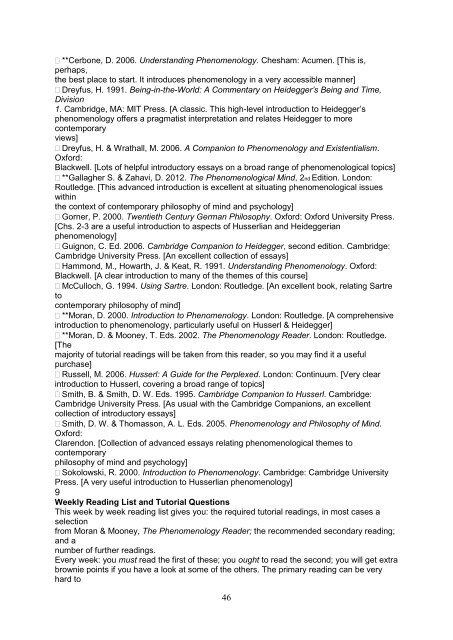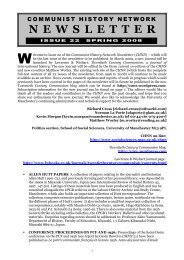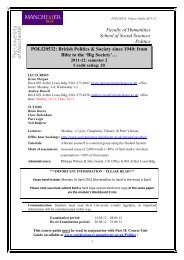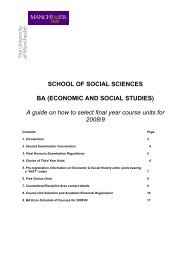second year course outlines 2012-2013 - School of Social Sciences ...
second year course outlines 2012-2013 - School of Social Sciences ...
second year course outlines 2012-2013 - School of Social Sciences ...
You also want an ePaper? Increase the reach of your titles
YUMPU automatically turns print PDFs into web optimized ePapers that Google loves.
**Cerbone, D. 2006. Understanding Phenomenology. Chesham: Acumen. [This is,<br />
perhaps,<br />
the best place to start. It introduces phenomenology in a very accessible manner]<br />
Dreyfus, H. 1991. Being-in-the-World: A Commentary on Heidegger’s Being and Time,<br />
Division<br />
1. Cambridge, MA: MIT Press. [A classic. This high-level introduction to Heidegger’s<br />
phenomenology <strong>of</strong>fers a pragmatist interpretation and relates Heidegger to more<br />
contemporary<br />
views]<br />
Dreyfus, H. & Wrathall, M. 2006. A Companion to Phenomenology and Existentialism.<br />
Oxford:<br />
Blackwell. [Lots <strong>of</strong> helpful introductory essays on a broad range <strong>of</strong> phenomenological topics]<br />
**Gallagher S. & Zahavi, D. <strong>2012</strong>. The Phenomenological Mind, 2nd Edition. London:<br />
Routledge. [This advanced introduction is excellent at situating phenomenological issues<br />
within<br />
the context <strong>of</strong> contemporary philosophy <strong>of</strong> mind and psychology]<br />
Gorner, P. 2000. Twentieth Century German Philosophy. Oxford: Oxford University Press.<br />
[Chs. 2-3 are a useful introduction to aspects <strong>of</strong> Husserlian and Heideggerian<br />
phenomenology]<br />
Guignon, C. Ed. 2006. Cambridge Companion to Heidegger, <strong>second</strong> edition. Cambridge:<br />
Cambridge University Press. [An excellent collection <strong>of</strong> essays]<br />
Hammond, M., Howarth, J. & Keat, R. 1991. Understanding Phenomenology. Oxford:<br />
Blackwell. [A clear introduction to many <strong>of</strong> the themes <strong>of</strong> this <strong>course</strong>]<br />
McCulloch, G. 1994. Using Sartre. London: Routledge. [An excellent book, relating Sartre<br />
to<br />
contemporary philosophy <strong>of</strong> mind]<br />
**Moran, D. 2000. Introduction to Phenomenology. London: Routledge. [A comprehensive<br />
introduction to phenomenology, particularly useful on Husserl & Heidegger]<br />
**Moran, D. & Mooney, T. Eds. 2002. The Phenomenology Reader. London: Routledge.<br />
[The<br />
majority <strong>of</strong> tutorial readings will be taken from this reader, so you may find it a useful<br />
purchase]<br />
Russell, M. 2006. Husserl: A Guide for the Perplexed. London: Continuum. [Very clear<br />
introduction to Husserl, covering a broad range <strong>of</strong> topics]<br />
Smith, B. & Smith, D. W. Eds. 1995. Cambridge Companion to Husserl. Cambridge:<br />
Cambridge University Press. [As usual with the Cambridge Companions, an excellent<br />
collection <strong>of</strong> introductory essays]<br />
Smith, D. W. & Thomasson, A. L. Eds. 2005. Phenomenology and Philosophy <strong>of</strong> Mind.<br />
Oxford:<br />
Clarendon. [Collection <strong>of</strong> advanced essays relating phenomenological themes to<br />
contemporary<br />
philosophy <strong>of</strong> mind and psychology]<br />
Sokolowski, R. 2000. Introduction to Phenomenology. Cambridge: Cambridge University<br />
Press. [A very useful introduction to Husserlian phenomenology]<br />
9<br />
Weekly Reading List and Tutorial Questions<br />
This week by week reading list gives you: the required tutorial readings, in most cases a<br />
selection<br />
from Moran & Mooney, The Phenomenology Reader; the recommended <strong>second</strong>ary reading;<br />
and a<br />
number <strong>of</strong> further readings.<br />
Every week: you must read the first <strong>of</strong> these; you ought to read the <strong>second</strong>; you will get extra<br />
brownie points if you have a look at some <strong>of</strong> the others. The primary reading can be very<br />
hard to<br />
46

















